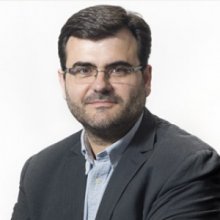Images
Participants

Contact

The project, headed by group leader and ICREA researcher Eduard Batlle, receives a 60,000-€ grant.
The study will test the effectiveness of immunotherapies to treat metastatic disease in advanced colorectal cancer.
Research will take place during the academic years 2017 and 2018.
ICREA researcher and group leader of the Colorectal Cancer Laboratory at IRB Barcelona, Eduard Batlle, has been awarded the biannual Olga Torres Foundation (FOT) grant for the study of colorectal cancer. Batlle’s project, “Evaluating immunotherapies in a preclinical model of metastatic colorectal cancer”, has obtained one of the 60,000-€ grants given by this organisation in late 2016 and will be undertaken during 2017 and 2018.
The main aim of the project is to exploit a novel model system of advanced colorectal cancer developed in-house, in order to understand the interactions between immune cells and colorectal cancer cells and to test the effectiveness of immunotherapies to treat metastatic disease in advanced colorectal cancer.
The Parc Taulí has hosted the award ceremony, chaired by the Deputy Mayor of Sabadell City Council, Joan Berlanga, the President of the FOT, Josep Bombardó, the President of the Parc Taulí, Modesto Custodio, the coordinator of the Colorectal Surgical Unit of theHospital de Mataró and President of the Spanish Association of Major Surgery, Lluís Hidalgo and the representative of the Academy of Medical Sciences, Eugeni Saigí.
A promising strategy: the immunotherapy
“Around 1 in every 20 people will develop colorectal cancer in western countries, and it is estimated that this year this disease will cause more than 700,000 deaths worldwide,” explains the researcher.
Eduard Batlle highlights that the vast majority of these deaths will occur due to the spread of the disease to secondary organs, a process known as metastasis. And he adds, “therapeutic approaches such as systemic chemotherapy do not cure metastatic disease. Therefore, there is an unmet need for novel strategies to target colorectal cancer at advance stages. Immunotherapies are among the most promising strategies to treat late-stage cancers”.
Last May, in the conference series Ciencia After Work a la Pedrera, Batlle also acknowledged that one of the great hopes is for immunotherapy to unleash the potential of the immune system to recognise and attack specific tumour cells and that this strategy has considerable advantages over other therapies.
About the FOT grants
The Olga Torres Foundation is a private non-profit organisation dedicated to cancer research and the contribution of cancer to immune alterations. With the aim to promote high-level scientific, technological and social research, the FOT grants fund investigation into colon cancer, as this disease widely affects the population.
This is the fifth time an IRB Barcelona researcher has won this award in its Emerging researchers and Established researchers modality. Between 2011 and 2015, the following scientists received this funding: Dr. Anna Merlos Suàrez, researcher in the Colorectal Cancer Lab; Dr. Jelena Urosevic, researcher in the Growth Control and Cancer Metastasis Lab; Dr. Enza Lonardo, researcher in the Colorectal Cancer Lab; and Dr. Raquel Batlle, researcher in the Signalling and Cell Cycle Laboratory.
About IRB Barcelona
Created in 2005 by the Generalitat de Catalunya (Government of Catalonia) and University of Barcelona, IRB Barcelona is a Severo Ochoa Centre of Excellence, a seal that was awarded in 2011. The institute is devoted to conducting research of excellence in biomedicine and to transferring results to clinical practice, thus improving people’s quality of life, while simultaneously promoting the training of outstanding researchers, technology transfer, and public communication of science. Its 24 laboratories and seven core facilities address basic questions in biology and are orientated to diseases such as cancer, metastasis, Alzheimer’s, diabetes, and rare conditions. IRB Barcelona is an international centre that hosts more than 400 employees and 36 nationalities. It is located in the Barcelona Science Park. IRB Barcelona forms part of the Barcelona Institute of Science and Technology (BIST) and the “Xarxa de Centres de Recerca de Catalunya” (CERCA).
About IRB Barcelona
The Institute for Research in Biomedicine (IRB Barcelona) pursues a society free of disease. To this end, it conducts multidisciplinary research of excellence to cure cancer and other diseases linked to ageing. It establishes technology transfer agreements with the pharmaceutical industry and major hospitals to bring research results closer to society, and organises a range of science outreach activities to engage the public in an open dialogue. IRB Barcelona is an international centre that hosts 400 researchers and more than 30 nationalities. Recognised as a Severo Ochoa Centre of Excellence since 2011, IRB Barcelona is a CERCA centre and member of the Barcelona Institute of Science and Technology (BIST).





